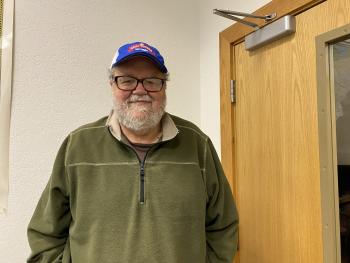Dee Davis

Carr Creek Oral History Project
This collection is comprised of audio-recorded interviews conducted during 2022-2023 by folklorist Nicole Musgrave with support from the Kentucky Oral History Commission. Her work was part of an effort to document the geographic and human impact of the construction of the Carr Fork Reservoir in southeastern Kentucky, which was completed in 1976. The collection’s twenty interviews with residents of Knott, Letcher and Perry Counties range in focus and content. Most of the interviewees were affected by dislocation in some way. They express different opinions about the lake and its impact on the community. Most interviewees share memories of what the area was like before the lake was built, and many have vivid memories of what the construction process was like.
National Capital Contracting
Dee Davis, a native of Hazard, Kentucky, is a prominent figure in the field of rural strategies and social change campaigns. Born to parents who were also from Hazard, Davis has deep roots in the Appalachian region, with his family's history in the area dating back to the 1700s. He attended Hazard High School before moving on to college and eventually settling in Whitesburg, Kentucky, where he has spent the majority of his adult life. Davis is the president of the Rural Strategies Center for Rural Strategies, an organization that has been involved in various social change campaigns. The organization's office, fondly referred to as the "War Room," serves as a hub for their operations, doubling as a storage room, lunchroom, and whatever else is needed at the time. Davis's work has taken him to various locations, as indicated by the map in the War Room. Despite his extensive work in rural strategies, Davis's experiences are not limited to this field. He has also been affected by significant events in the region, such as the floods of 1957, 1963, and 1967, which led to the construction of the Carr Fork Dam and the Little Shepherd Dam.
Scope and Content Note
The interview with Dee Davis, conducted by Nicole Musgrave on March 31, 2023, provides a comprehensive insight into Davis's life, work, and experiences in the Appalachian region, particularly in relation to the Carr Creek Oral History Project. The discussion begins with Davis's personal background and his role at the Rural Strategies Center for Rural Strategies. The conversation then shifts to the significant events that have shaped the region, including the devastating floods that led to the construction of the Carr Fork Dam and the Little Shepherd Dam. Davis shares his memories of these events, highlighting the impact they had on the community and the subsequent efforts to prevent future flooding. The interview also delves into the broader plans that were in place at the time, which were not widely known to the public. Additionally, Davis discusses the rich history and stories of the area that is now underwater due to the dam construction, including the nationally famous Carr Creek basketball team and the renowned writer James Steele. The interview concludes with Davis emphasizing the importance of these stories in understanding the region's history of aspiration, achievement, disappointment, and unexpected twists and turns.
Please Note: The oral histories in this collection are protected by copyright and have been created for educational, research and personal use as described by the Fair Use Doctrine in the U.S. Copyright law. Please reach out Voices@noaa.gov to let us know how these interviews are being used in your research, project, exhibit, etc. The Voices staff can help provide other useful resources related to your inquiry.
The NOAA mission is to understand and predict changes in climate, weather, oceans, and coasts, to share that knowledge and information with others, and to conserve and manage coastal and marine ecosystems and resources. The Voices Oral History Archives offers public access to a wide range of accounts, including historical materials that are products of their particular times, and may contain offensive language or negative stereotypes.
Voices Oral History Archives does not verify the accuracy of materials submitted to us. The opinions expressed in the interviews are those of the interviewee only. The interviews here have been made available to the public only after the interviewer has confirmed that they have obtained consent.
